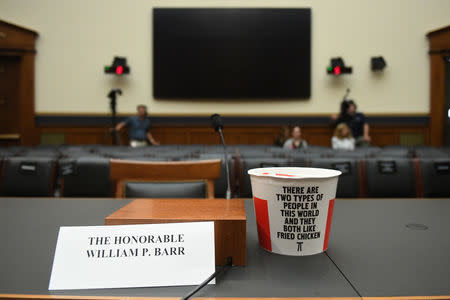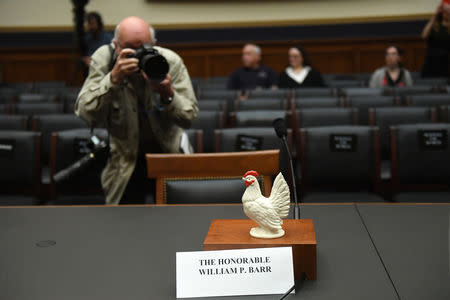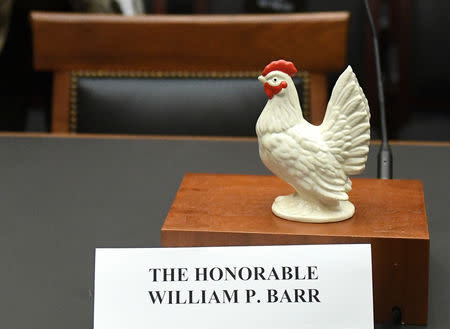U.S. Congress displays political art of the empty chair after Barr no-show
By Ginger Gibson
WASHINGTON (Reuters) - Political theater sometimes calls for props. On Thursday Democrats on the U.S. House of Representatives Judiciary Committee pulled out a classic: the empty chair.
When U.S. Attorney General William Barr failed to show up for a committee hearing to testify about his handling of the Mueller report, Democratic Chairman Jerrold Nadler convened the hearing anyway.
At the center of the room was a long witness table with a folded placard bearing Barr's name. Behind that was a single empty chair, all neatly arranged for the cameras.
Barr canceled his scheduled appearance after clashing with Nadler over the format of the hearing. Democrats are now weighing whether to hold Barr in contempt.
It wasn't the first time - nor likely the last - that politicians rolled out a vacant chair to try to make a point.
In 2018, the Senate Intelligence Committee convened a hearing on election meddling by foreign state-sponsored agents and Google opted not participate. The committee set out an empty chair
In 2017, Trump convened a meeting with then-House Speaker Paul Ryan and Senate Majority Leader Mitch McConnell that set out an empty seat for Nancy Pelosi, who was then the House minority leader.
"His empty chair photo opp showed he’s more interested in stunts than in addressing the needs of the American people. Poor Ryan and McConnell relegated to props," Pelosi wrote on Twitter at the time.
Actor and director Clint Eastwood famously bombed with his attempt at an empty chair routine during the 2012 Republican National Convention.
Eastwood, who backed Republican candidate Mitt Romney's bid for president, brought an empty chair on stage for an imagined conversation with then Democratic President Barack Obama. Critics at the time said the routine made little sense and only generated confusion.
At other times, lawmakers have opted to skip the empty chair and go straight to contempt. In 2012, House Republicans voted to hold then-Attorney General Eric Holder in contempt for refusing to comply with their investigation to the botched "Fast and Furious" weapons program.
In that fight, Obama invoked executive privilege and ultimately Holder's Justice Department opted not to prosecute him in response to Congress's contempt vote.
(Additional reporting by David Morgan and Sarah N. Lynch; Editing by Kevin Drawbaugh and Bill Berkrot)





